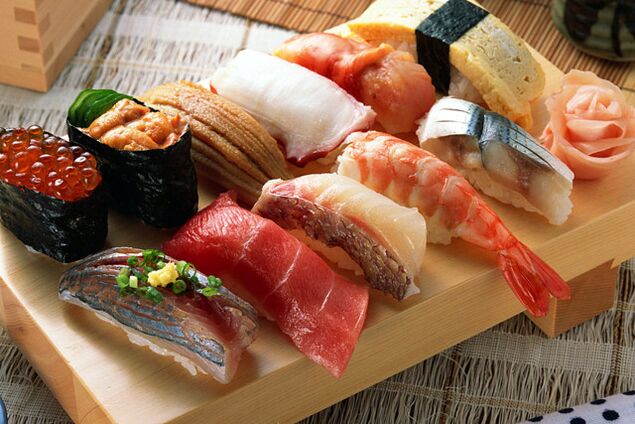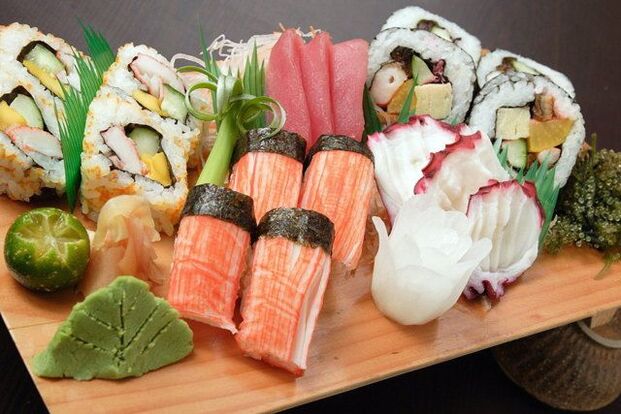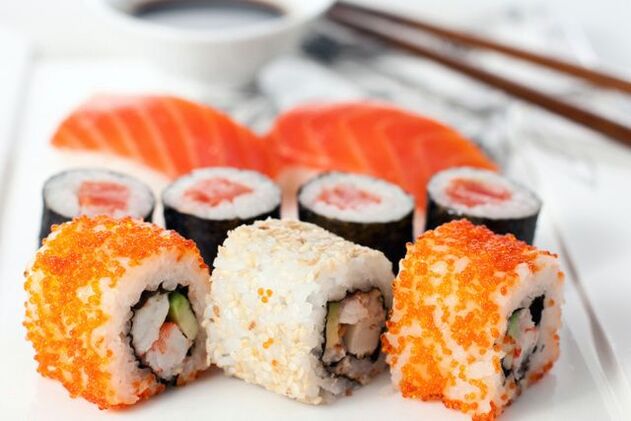
The Japanese diet is considered one of the most effective and popular modern diets.
Why? Because within a fairly short period of time - 14 days, you can get rid of 7 to 11 extra pounds.
Such a rapid effect is explained by the fact that the Japanese diet is not balanced, that is, it is compiled regardless of the proportions of fats, proteins and carbohydrates. In addition, the Japanese diet menu is quite low in calories due to the low content of carbohydrates in it, which makes the body work on burning its own fat layer.
The main purpose of the Japanese diet is to change the pace of metabolic processes in the body, which then allows you to maximize the effect of weight loss for 2-3 years.
The essence of the Japanese diet
The essence of the Japanese diet is food with an increased amount of protein, which is supplied by the foods allowed in the diet: meat, fish, dairy products.
The Japanese diet is considered quite rigid due to strict menu restrictions. During the Japanese diet, you can not eat:
- salt;
- spices;
- sugar and cakes;
- alcohol.
However, if you are used to drinking only coffee for breakfast and prefer meat and fish to food, the Japanese diet will not seem so difficult. Moreover, one of the advantages of this diet are the fermented milk products, fruits and vegetables allowed in the diet.
Fluid intake during the Japanese diet is not limited - you can drink as much as you want during the day, but not less than 1, 5 liters per day. You can drink mineral water, tea or just plain water.
There are several menu options for the Japanese diet for 14 days, which do not differ much from each other in the composition of the products. But if you have chosen one option, you should not "jump" to another if the first one suddenly does not suit you for some reason.
Japanese diet menu for 14 days

Strictly observe the menu shown in the table below:
| BREAKFAST | dinner | dinner | |
|---|---|---|---|
| Day 1 | a cup of coffee | 2 boiled eggs, cabbage sauce with vegetable oil, a glass of tomato juice. | boiled or fried fish (200 grams) |
| Day 2 | coffee, 1 cracker | 100 grams of boiled or fried fish, tulip salad (with vegetable oil). | boiled beef (100 grams), a glass of kefir. |
| Day 3 | coffee, crackers | fried zucchini (200 grams) | 2 boiled eggs, 200 grams of boiled beef, cabbage sauce. |
| Day 4 | coffee | raw eggs, 3 raw carrots grated with vegetable oil, 20 grams of parmesan | fruit |
| Day 5 | grated carrots seasoned with lemon. | boiled or fried fish (200 grams), a glass of tomato juice | fruit |
| Day 6 | a cup of coffee | ½ salad with boiled chicken, carrots and cabbage | 2 hard boiled eggs, grated carrots with vegetable oil |
| Day 7 | green tea | boiled beef (200 grams), fruit | every dinner of the previous days (except the third! ) |
| Day 8 | green tea | ½ salad with boiled chicken, carrots and cabbage | 2 boiled eggs, cabbage and carrot salad |
| Day 9 | coffee | 200 grams of boiled or fried fish, a glass of tomato juice | any fruit |
| Day 10 | coffee | 1 egg (raw), 3 grated carrots with vegetable oil, 20 grams of parmesan | fruit |
| Day 11 | coffee, 2 sugar-free biscuits | zucchini fried in vegetable oil (200 grams) | 2 eggs (hard boiled), 200 grams of boiled beef, cabbage sauce |
| Day 12 | coffee (2 dry biscuits) | boiled or fried fish (200 grams), salad with carrots or cabbage | 200 grams of boiled beef, a glass of kefir |
| Day 13 | coffee | 2 boiled eggs, cabbage sauce with carrots, 1 glass of tomato juice | boiled or fried fish (200 grams) |
| Day 14 | coffee | fried or boiled fish (200 grams), cabbage sauce with carrots | 200 grams of boiled beef, a glass of kefir |
Japanese diet plan and rules

1. Consultation with the doctor
- First, the Japanese diet predicts continued consumption of black coffee, which may be contraindicated for people with cardiovascular disease, hypotension and hypertension. Your doctor may recommend replacing black coffee with green tea.
- Second, a large amount of protein leads to a load on the kidneys, which can cause weakness and loss of strength, headaches and acetone taste in the mouth.
The Japanese diet is contraindicated:
- breastfeeding mothers and children;
- during physical exertion and hard work.
2. Preparing for a diet
Directly before the diet, it is necessary to organize a day of fasting: instead of breakfast and lunch, it is recommended to drink 2-3 glasses of kefir or milk, for dinner - a small piece of buckwheat or rice and a salad of fresh vegetables. .
3. Foods during the diet
- Coffee used during the diet should be natural, as it contains antioxidants that support the body.
- It is recommended to cook meat and fish in a double boiler or fry in a small amount of oil.
- Olive oil is recommended for dressing vegetable salads.
4. Vitamins
A low calorie diet can not provide the body with the necessary substances, therefore, it is necessary to take a vitamin-mineral complex at that time.
5. Get off the diet
You can not organize a "stomach feast" for getting out of the diet and jumping into food.
The caloric content of the diet should be increased gradually: you should add salt to the food little by little, eat starchy and sweet in moderation.
The main rules of the Japanese diet:
- Observe the diet carefully during the day, do not confuse the sequence of days.
- Use only the products listed in the menu.
- Drink 1. 5 liters of fluid a day.
- Do not continue the diet for more than 14 days.
Japanese diet reviews for 14 days
1. Doctor reviews
The Japanese diet is considered very strict, so first of all you need to have a psychological attitude in order to prevent nervous breakdowns during the diet. The body gets stressed due to low calorie foods, and therefore temporary metabolic disorders and "food spoilage" are possible.
2. Other reviews
First review: From my experience I want to say that the Japanese diet is very hard to bear. Especially in the early days. But the result is minus 9 kg. And 4 months have passed, and the weight is not back, however, I keep fit with the help of fitness.
Second review: The first 4 most difficult days. There was even dizziness. But the result was 100% rewarded. Minus 10 pounds! Yes, and the body cleanses itself well during this time.
Third review: From the benefits - delicious products, there is no need to drown in kefir or buckwheat. Of the minuses - weakness in the first days, a feeling of hunger. The result is minus 7 pounds.
As you can see, the effectiveness of the diet is confirmed in practice, however, when you start a diet, the main thing is to gather all your willpower in your fist and try not to break away.




















